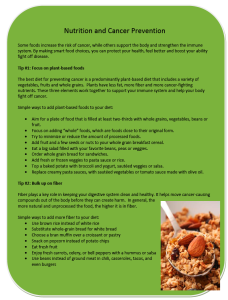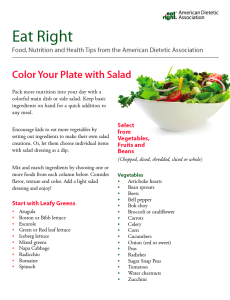According to the National Cancer Institute, approximately 35% of cancers have a nutritional connection. Laura Kenny, a Registered Dietitian with Riverview Hospital, recently led a seminar on Nutrition in Cancer Prevention and shares a summary of her presentation here.
It is possible to prevent 35% of cancers by:
- Following a healthy diet
- Maintaining a healthy weight
- Performing regular exercise

It is possible to prevent 30% of cancers by:
- Not using tobacco
Guidelines for cancer prevention:
- Choose a diet rich in a variety of plant-based foods.
- Eat plenty of fruits and vegetables.
- Maintain an healthy weight and be physically active.
- Drink alcohol only in moderation, if at all.
- Select foods low in fat and salt.
- Prepare and store food safely.
Obesity is a risk factor for the following types of cancers, primarily:
- Breast
- Colon
- Endometrial
- Esophogeal
- Gall bladder
- Pancreas
- Kidney
- Reccuring cancer

Obesity acts as a tumor promoter and may increase the risk of cancer by 150-450%. Obesity is a risk factor for the following types of cancers:
- Breast
- Colon
- Endometrial
- Esophageal
- Gall Bladder
- Pancreatic
- Kidney
- Recurring cancer
Dietary fat:
- High fat diets are associated with obesity.
- High intakes of total and saturated fat increases the risk of breast, colon, lung and prostate cancers.
- Animal fat increases the risk of breast cancer.
- Higher Omega-3 versus Omega-6 may reduce the risk of breast cancer.
Protein:
- Low protein diets reduce the risk of cancer.
- Increased red meat intake is associated with an increased risk of colon and advanced prostate cancer.
- The recommended daily amount of protein is approximately 50-60 grams.
- 1 ounce of meat = 7 grams of protein.
- Limit your consumption of red meat.
- Choose fish, poultry or beans and an alternative to beef, pork, and lamb.
- When you eat meat, select lean cuts and smaller portions.
- Prepare meat by baking, broiling or poaching rather than by frying or charbroiling.
Fiber:
- Fiber-rich diets protect against colon cancer.
- Higher intakes of vegetables decrease colon cancer risk.
- High fiber diets tend to be meat, fat, and refined carbohydrates.
- A daily fiber goal should be 20-35 grams.
Fruits and Vegetables:
- Increased consumption lowers the risk of most cancers.
- Flavenoids and lingans are associated with a lower risk of most sex hormone-related cancers.
- Great sources of antioxidants, Vitamins C, E and Selenium as well as phytochemicals.
- Eat 5+ servings of fruits and vegetables daily.
- Include vegetables and fruits and every meal and for snacks.
- Eat a variety of vegetables and fruits.
- Limit French fries, potato chips and other fried vegetable products.
- Choose 100% juice.
Food Safety:
- Choose in-season, locally-grown produce.
- Rinse fruits and vegetables and remove outer leaves.
- Use proper food storage to prevent growth of fungal carcinogens.
- Marinate protein foods to decrease cooking time.
- Use cooking methods to avoid contact of foods and food drippings with flames.
- Use lower cooking temperatures with protein foods.
Grains:
- Choose whole grains instead of processed (refined) grains and sugars.
- Choose whole grain rice, bread, pasta and cereals.
- Limit the consumption of refined carbohydrates, including pastries, sweetened cereals, soft drinks and sugars.
